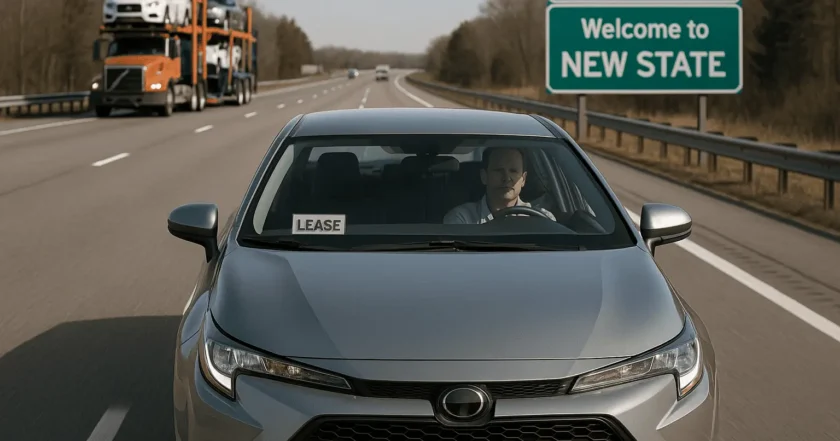Moving to a new state is a big step. One of the first things you could ask yourself is: Can a leased or financed car be taken out of state? Since you do not own the vehicle legally, the answer depends on your lease or loan contract, the policies of the lender or leasing company, and the laws of the new state.
Key Takeaways
- Always notify your leasing company prior to moving. They hold the vehicle title and must provide authorization for out-of-state registration.
- Each state has specific registration deadlines for new residents — for example, California allows 20 days, while Texas allows up to 30 days. Failing to comply can result in fines or penalties.
- Some agreements restrict permanent out-of-state moves or require written approval from the lessor.
- Required documents for registration typically include the lease agreement, lessor’s consent, proof of insurance, out-of-state registration, and a driver’s license from the new state.
- Financed cars are easier to move between states, but lenders may need updated insurance and registration details.
- For leased cars, some states require emissions or safety inspections before issuing new tags. Always confirm DMV requirements before scheduling registration.
Being aware will thus allow you to make a smooth transition without stumbling on costly mistakes.
Lease Agreements and State Restrictions
The very first steps to consider when determining whether the leased car can go out of state entail checking one’s lease or finance agreement. Being a literal contract, it tells you what you can or cannot do with the leased vehicle. Such things as these need to be studied:
- Relocation clauses: Vehicle leases may impose a prohibition on an out-of-state move or may allow a move only to a certain state or region. For violating this, you may have to pay penalties or may even get your car repossessed.
- Need for approvals: In some cases, the lease will specify that you need to obtain written permission from the leasing company before moving the vehicle out of state.
- Insurance and tax duties: The state in question may have laws affecting your sales tax, vehicle registration, and insurance coverage, thereby directly affecting your monthly payments.
If the lease agreement is unclear on or silent about the issue of relocation, one should immediately communicate with the leasing company. Discuss your plans so that the issue of violation of any clause does not arise.
It is a matter better clarified beforehand than to risk penalties later. Generally, leasing companies do allow such moves with documentation and possibly an amendment to the lease.
Notifying Your Leasing Company
Even if your lease agreement allows for an out-of-state move, you must notify the leasing office prior to such relocation. The leasing company holds the title to your vehicle, and its consent is required to register the vehicle in another state. If they do not consent, you will find it impossible to do so.
Be sure to inquire about:
- Whether your lease explicitly allows for permanent moves
- What paperwork will be needed for your retitling and registration
- Where you would be required to return the vehicle once the lease ends
Some companies let you return the car to a local dealership in your new state, while in others, you have to go back to the original dealer. Being prepared could save you from last-minute unforeseen situations.
Your lessor may also prepare a limited power of attorney for you to act on their behalf to complete registration. Since legally they are the owners, they would have to submit the vehicle title (or a certified copy) to the Department of Motor Vehicles (DMV) in the new state.
Registration of a Leased Car in the New State
If you have newly moved to any state in America, you have to register your vehicle within some days, the number of which is determined by the state. In California, for example, new residents should register within 20 days, while in Texas the period is extended up to 30 days. Late fees or penalties are applicable if you fail to comply with the deadline.
If you’re relocating with a leased vehicle, below is a list of normal requirements that need to be met in order for you to change the registration:
- A certified duplicate title obtained from the financial institution that has the title released to the customer
- Current registration for the previous state
- Insurance in compliance with the state regulations
- A driver’s license from the new state
- Lessor’s permission to register the vehicle
- Payment of registration costs and any related charges
A number of states have a policy requiring emissions examination or a safety assessment before the issuance of new tags. Since the car is on lease, make sure you have the documents establishing the leasing company as the owner of the car.
When all the processes are completed, the applicant will get a motor vehicle tag and a graphite proof that the vehicle has been registered with the state.
Such a situation often leads to a common inquiry: Can you register a leased car in another state? The response to this would be yes, although with the consent of your lessor only. They have the final say over the title, and if they are unwilling to assist, then the transfer of the title will be impossible from the DMV.
Insurance and License Updates
Insurance laws will also change by state. For instance, unique no-fault car insurance laws exist in Michigan, along with some of the highest premiums, while states like Vermont have relatively low requirements for minimum limits. One thing that is for sure is that once you move, your old insurance may no longer be valid anymore.
Update your address with your insurance company and check whether they do business in your new state. If not, then purchase a new policy before registering your car. Proof of insurance submission is required at the DMV.
Driver’s licensing records will have to be updated within 30 to 90 days (sometimes more). Like registration, a visit to the DMV, proof of residency, your current license, and a fee are all required.
Additional Considerations for Financed Cars
A financed vehicle is slightly different from one that is leased. The buyer owns the vehicle but does not own the title; hence, it must be held by the lender until the buyer finishes paying the loan. Extension of cooperation is needed from the lender while retitling a car in the new state.
Unlike leasing companies, most banks and credit unions do not restrict the movement of their vehicle loans across state lines. They might, however, require proof of re-registration and insurance set up for the vehicle within the new state. Some might even adjust your loan terms if the tax rates vary considerably from state to state.
Should your lender not do business in your new state, they may assign your loan to a company that does. Always make sure to contact them before the move to check on their requirement.
Preparing a Leased or Financed Car for Transport
In the process of shipping, the preparation should be of concern. Since the vehicle isn’t yours outright, you are obligated to return it in the given condition. The following are the steps that need observation:
- Clean the exterior thoroughly: Wash and dry the vehicle so that any existing scratches, dents, or chips can be recorded before shipping, thus determining the car’s condition upon arrival.
- Take photos from all angles: Take wide-angle shots and close-ups of the general exterior, roof, bumpers, and wheels. These photos serve as backup in case of disputes with the carrier or leasing company.
- Remove personal belongings and accessories: Auto transport insurance usually covers personal property, and loose personal items inside the car may just get lost or damaged, or worse, cause damage themselves.
- Check for leaks or mechanical issues: To ensure the car is safe and ready for loading, schedule a quick inspection with your mechanic.
Even a tiny scratch might attract hundreds at the lease return, so being careful can spare you some dollars. If moving happens to be a seasonal event, such as during winter when roads could be dangerous, make sure you follow guide resources like the seasonal movers guide.
Tips for a Smooth Move
Moving with a leased or financed car can be a nerve-wracking experience, and some preparations can make it go smoothly. Here are some pointers for you:
1. Notify Your Lessor Early
In the case you want to pack your things, be sure to check in with your leasing company beforehand. Make sure they are given your exact date of moving and new address. That way, they will be able to issue the necessary papers for registration in the new state, as well as explain if restrictions exist in taking the lease vehicle out of state.
Giving them early notice also gives you time to ask about any tax implications or extra fees that may pertain to your destination.
2. Review Your Lease Agreement Thoroughly
Read thru your lease agreement carefully so as to examine the clauses involving relocation or out-of-state use. Some require explicit written permission to move the vehicle; others allow the relocation upon notification.
Knowing these details means you will avoid unintentionally violating terms of the lease that could lead to fines, penalties, or even termination of the lease. Should anything be unclear, do not hesitate to inquire for clarification from your leasing company.
3. Prepare All Necessary Documents
Make sure you carry essential documents for moving: lease contract, current registration, proof of insurance, and driving license. The lessor usually issues a limited power of attorney for your use to register the vehicle in the new state.
Beyond this, check whether the respective DMV of the state imposes further requirements for the vehicle being registered: emission tests or anything of the kind. Being organized will make registration and titling smooth.
4. Decide Whether to Drive or Ship Your Car
One has to decide whether to drive the leased car to a new house or ship it. Driving will save you money, but of course, it adds miles and wear and tear, which may be considered at the time of vehicle return. Shipping will add cost but minimize risk.
5. Ensure Vehicle Safety and Condition
Have your car inspected by a trustworthy mechanic and have any mechanical issues resolved before moving. Clean the car inside and out; photos of its current condition, scratches, or dents can back up claims if damage occurs in transit.
Remove items of personal effect, and accessories that might otherwise be stolen. When using a professional transport, secure your car properly and always go with a reputable experienced company for handling leased vehicles.
Returning the Vehicle at Lease End
If you have moved states, at the expiration of the lease contract, you must return the leased automobile. Most contracts ask that it be returned to the original dealership. Should your leasing company have places in the new state, an arrangement must be made to return them locally.
If the leasing company insists on the car being returned to the original state, drive the car back or arrange for an auto transport service to do that for you. Remember that charges occur for excess mileage and damage; it may be better to pay for shipping rather than incur penalties.
So, can you move out of state with a leased car? Most of the time, yes, as long as you adhere to certain restrictions imposed by your leasing company and the DMV in your new state. The keyword here is “preparation”: review your contract, notify your lessor, gather the required documents, and promptly register for your new state.
Frequently Asked Questions
How to Register a Leased Car in Another State?
For registration, you should bring your license, proof of insurance, current registration, and consent from the leasing company. The lessor must put the title in the name of your new DMV. After inspections and fees, you will have new plates issued to you. Some states require that the old plates be returned, so check the local laws to avoid getting into trouble.
What Happens if You Move Out of State While Leasing a Car?
Changing the state of residence requires notifying your leasing agency. You are mandated to retitle and register the vehicle in your new state of residence. Not updating these records will give rise to fines, tax problems, or breach of lease. The leasing company must approve the change so that your car is legally registered and insured.
Can Moving Out of State Void My Lease?
Rarely does a relocation terminate a lease. But contracts could tie a vehicle to moving across state lines. Should your lessor have no presence in the state of your relocation, an amendment to the lease or early return of the car may be necessary. Penalties or legal consequences may arise from breaking the terms without approval.
Can You Drive a Leased Car Out of State?
Yes, you can drive a leased car across state lines during travel or business trips. The conflict arises when you plan to register the car somewhere permanently. The temporary stay is generally allowed, but check in detail the lease terms for such restrictions including mileage, extended stays, or insurance coverage.
Can You Transfer a Lease After Moving States?
There are lease companies out there that will do a lease transfer upon meeting certain criteria. The potential new driver must pass credit checks and agree to payments. Not every lessor will go for interstate transfers, so check first so as not to get yourself in trouble or complications.
Do You Need Emissions Testing When Moving with a Leased Car?
Depending upon what state you are in, requirements vary. For example, in California, the car must be emission-tested (smog inspection) before registration. If the leased car fails, you need to get it repaired. It is on you to be compliant, so make sure it passes to avert any late fees, denial of registration, or just uncalled delays.
Sources:
- Michigan Department of Insurance and Financial Services, “No-Fault Auto Insurance in Michigan”, Accessed November 5, 2025.
- State of Vermont, Agency of Administration, “Insurance Specification 2023 Revision”, Accessed November 5, 2025.
- California Department of Motor Vehicles, “Register a Vehicle from Out of State (Nonresident Vehicle)”, Accessed November 5, 2025.
- Texas Department of Motor Vehicles, “New to Texas”, Accessed November 5, 2025.






